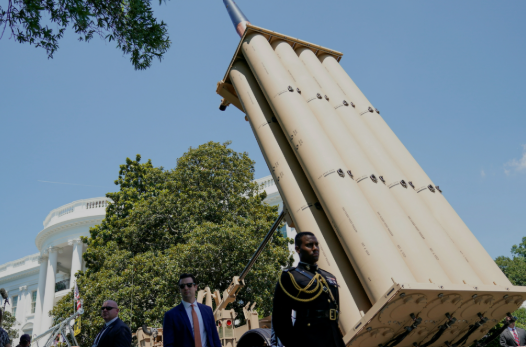While working Americans brace for potential cuts to critical programs like Medicaid and SNAP, Republican leaders in Congress are advancing a plan that would funnel billions of taxpayer dollars into what experts are calling an unrealistic and costly defense project.
According to reporting from Reuters on Thursday, Republican lawmakers are preparing to attach a $150 billion defense package to their sweeping tax-and-spending bill. A key feature of that package? An initial $27 billion investment toward building what former President Donald Trump has described as a “Golden Dome” missile defense shield for the United States.
Trump, who first floated the idea during a campaign speech earlier this year, envisioned an “Iron Dome for America,” drawing comparisons to Israel’s sophisticated anti-missile system. Yet during his remarks, Trump referred to it as a “Golden Dome”—a name that has drawn both mockery and concern from national security experts.
Critics warn the project is not only vastly more complex than Israel’s Iron Dome but borders on the impossible. Dylan Spaulding, a senior scientist with the Union of Concerned Scientists, bluntly described the “Golden Dome” proposal earlier this week as a “complete fantasy,” citing technological, logistical, and cost barriers that would be significantly greater than anything Israel has faced.
The $27 billion in initial funding would, according to congressional sources, go toward developing additional missile interceptors and expanding the Terminal High Altitude Area Defense (THAAD) system produced by Lockheed Martin, one of the largest U.S. defense contractors.
Moreover, Reuters recently reported that billionaire Elon Musk’s company, SpaceX, alongside two unnamed partners, has emerged as a frontrunner to secure critical contracts related to the Golden Dome’s missile tracking systems—a revelation that has raised fresh concerns about cronyism and corporate profiteering at taxpayer expense.
Adding further context, the defense package will be included within a broader tax plan Republicans are pushing, one that would slash taxes by approximately $5 trillion, yet add an estimated $5.7 trillion to the national debt over the next decade. Besides the missile shield, the proposed defense bill also includes funding for the construction of 14 additional warships and expanded homeland security initiatives.
While some voices within the Republican establishment, like Bob Peterson of the Heritage Foundation, have praised the investment—calling it “an important start” toward enhanced national defense—many Americans are seeing the situation differently.
The juxtaposition has not gone unnoticed: $27 billion for a speculative missile defense fantasy, while Republican lawmakers simultaneously seek deep cuts to programs like Medicaid, SNAP, and even Social Security.
“Golden Dome missile defense shield? WTF,” one observer wrote on social media. “Republicans want $27 billion for a golden dome fantasy, but they’re slashing Medicaid and Social Security. Vote accordingly in 2026.”
Rep. Greg Casar (D-Texas) also sounded the alarm, particularly about Musk’s involvement, tweeting: “More than 180 companies are interested, but Musk’s SpaceX just so happens to be the ‘front-runner’ for the contracts. Shut this corrupt deal down. No cuts to Medicaid and Social Security to pay for more Musk contracts.”
The growing outrage points to a broader, and troubling, trend: while working-class families are being told to tighten their belts, the wealthiest corporations and individuals seem poised to benefit from yet another wave of government largesse—this time cloaked in the rhetoric of national security.
As the debate unfolds, voters will face a clear choice in the 2026 elections: whether to support leaders prioritizing billion-dollar defense fantasies, or those committed to protecting the economic security of working Americans.



